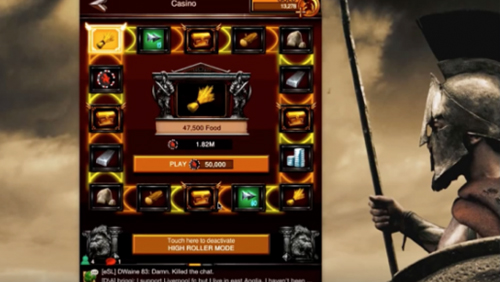Virtual casino losses are not “real-world” problems, according to U.S. District Judge James Bredar.
 The federal judge was referring to the Game of War, which is a free-to-play game, but players can buy digital gold—ranging from $4.99 for 1,200 pieces to $99.99 for 20,000—that they can exchange for virtual chips to wager on a virtual casino-like spinning wheel, according to ars technica. The virtual prizes that can be won with every spin include wood, stone, chips and even gold—the virtual kinds, of course.
The federal judge was referring to the Game of War, which is a free-to-play game, but players can buy digital gold—ranging from $4.99 for 1,200 pieces to $99.99 for 20,000—that they can exchange for virtual chips to wager on a virtual casino-like spinning wheel, according to ars technica. The virtual prizes that can be won with every spin include wood, stone, chips and even gold—the virtual kinds, of course.
Here’s the problem: a Maryland woman filed a class-action lawsuit against the game’s maker, California-based Machine Zone. In the suit, Mia Mason alleged the game’s algorithms are resulting in gamblers winning the basic prizes instead of the more valuable ones like gold.
In her suit, Mason claimed the virtual casino is an unlawful “slot machine or device,” from which she lost more than $100.
Bredar, however, dismissed the proposed lawsuit on grounds that it lacked “allegations of real-world harms or injuries.”
“On the surface, plaintiff charges that defendant trampled real and important rights and interests of her, wrongfully and unlawfully, in an alternative, virtual world created by an electronic game,” the judge said in the ruling. “But a careful probe beneath the surface reveals a hodgepodge of hollow claims lacking allegations of real-world harms or injuries. Perceived unfairness in the operation and outcome of a game, where there are no real-world losses, harms, or injuries, does not and cannot give rise to the award of a private monetary remedy by a real-world court.”
Furthermore, the judge said that following Mason’s logic, then other skills-based games like pinball should also be considered an illegal gambling device.
Bredar said that even if he were to decide in Mason’s favor, determining the damages she is owed would place him in an “unenviable position of pricing the conversion from virtual gold and chips to virtual wood and rock.”
“Such whimsical undertaking may spark the imaginations of children and ardent game enthusiasts, but it can have no place in federal court,” the judge declared.





